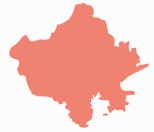Jodhpur district
Jodhpur district | |
|---|---|
Jodhpur | |
| Area | |
| • Total | 22,850 km2 (8,820 sq mi) |
| Population (2011)[1] | |
| • Total | 3,687,165 |
| • Density | 160/km2 (420/sq mi) |
| • Urban | 34.30 percent |
| Demographics | |
| • Literacy | 65.94 |
| • Sex ratio | 916 |
| Time zone | UTC+05:30 (IST) |
| Website | jodhpur |
Jodhpur District is a
is the administrative headquarters of the district.As of the 2011 census, it is the second highest populated district of Rajasthan (out of
Jodhpur is the historic center of the
Geography
The district is located in the State of
Jodhpur district comprises three distinct physiography units, the alluvial plains, sand dunes and escarpments. The western and north-western parts of Jodhpur district are characterised by sand dunes. With exception of some parts of Bilara and Osian tehsil, land surface of the district is nearly flat and sandy. Luni is the only important river in the district, it enters Jodhpur district near Bilara and flows for a distance of over 75 km. before entering in Barmer district.
Economy
Tourism
Jodhpur is famous for its rich history. It is also referred to as the Blue City and "Sun City". Blue City is derived due to the blue tinge to the whitewashed houses around the
Divisions
In the 2001 census, there were five sub-divisions in the district and seven tehsils.[3][4] For ease of administration, there were four sub-tehsils (Upa-tehsils): Balesar, Bap, Jhanwar and Tinwari.[4] Balesar and Bap has local councils (panchayat samiti).[4]
As of 2011, there were seven sub-divisions in the district and eleven tehsils. In addition to these, there were two independent sub-tehsils (Upa-tehsils): Jhanwar and Tinwari.[5]
| Subdivision | Subdivision Headquarters |
Tehsil | Tehsil Headquarters |
Panchayat Villages |
|---|---|---|---|---|
| Jodhpur Subdivision |
Jodhpur | Jodhpur Tehsil | Jodhpur | 0 |
| Bhopalgarh Subdivision |
Bhopalgarh | Bhopalgarh Tehsil | Bhopalgarh | 39 |
| Bawadi Tehsil | ? | 26 | ||
| Luni Subdivision |
Luni | Luni Tehsil | Luni | 41 |
| Osian Subdivision |
Osian | Osian Tehsil | Osian | 29 |
| Tinwari Tehsil | Tinwari | 26 | ||
| Phalodi Subdivision |
Phalodi | Phalodi Tehsil | Phalodi | 38 |
| Bap Tehsil | Bap | 32 | ||
| Bilara | Bilara | Bilara | Bilara | 40 |
| Shergarh Subdivision |
Shergarh | Shergarh Tehsil | Shergarh | 33 |
| Balesar Tehsil | Balesar | 33 |
All tehsils are development blocks and have
Villages
Demographics
According to the
Languages
Languages in Jodhpur district (2011)[12]
At the time of the 2011 census, 80.22% of the population spoke Rajasthani, 8.87% Marwari and 8.61% Hindi as their first language.[12]
Notable people
- Narayan Singh Bhati
- Jaswant Singh Bishnoi
- Vijaydan Detha, writer and folklorist. Born in Borunda (Bilara tahsil).[13]
- Ashok Gehlot (born 1951) 12th CM of Rajasthan.
- Mehdi Hassan (1927–2012) Pakistani Ghazal Singer
- Justice Devendra Kachhawaha, Judge, Rajasthan High Court, Jodhpur
- Barkatullah Khan (1920–73) Politician. Born in Jodhpur
- Gajendra Singh Khimsar
- Shailesh Lodha, Indian poet, actor, comedian and writer
- Parasram Maderna (1926–2014) Politician and Jat leader
- Sheo Dan Mal
- Narayan Singh Manaklao (born 1942) Social worker.
- Mathura Das Mathur
- Kamsa Meghwal
- Narayan Lal Panchariya
- Justice Kan Singh Parihar, (1913-2011), Judge of Rajasthan High Court and Vice Chancellor of Jodhpur University.
- Gajendra Singh Shekhawat, politician.
- Chitrangada Singh (born 1976) Bollywood Actress
- Abhishek Singhvi, lawyer and politician
- Om Thanvi (born 1957) Writer and editor. Born in Phalodi
- Ashwini Vaishnaw, Politician, former IAS officer & currently the Minister of Railways, Communications and Electronics & IT
- Jai Narayan Vyas (1899–1963) 3rd CM of Rajasthan.
See also
References
- ^ a b c d e f g h "District Census Handbook 2011 - Jodhpur" (PDF). Census of India. Registrar General and Census Commissioner of India.
- ^ "Taj Hotels". tajhotels.com. Retrieved 25 February 2022.
- ^ "Census 2001 Population Finder: Rajasthan: Jodhpur". Office of The Registrar General & Census Commissioner, Ministry of Home Affairs, Government of India. Archived from the original on 13 May 2013. Retrieved 13 May 2013.
- ^ a b c "Administrative Setup". Jodhpur District. Archived from the original on 25 December 2002.
- ^ a b "Administrative Setup". Jodhpur District. Archived from the original on 6 August 2013.
- ^ a b "Reports of National Panchayat Directory: Block Panchayats of Jodhpur, Rajasthan". Ministry of Panchayati Raj, Government of India. Archived from the original on 13 November 2011. Retrieved 13 May 2013.
- ^ "Map:Jodhpur District, Administrative Setup". Jodhpur District. 2007. Archived from the original on 9 April 2009.
- ^ a b "Reports of National Panchayat Directory: Report on Urban Local Bodies". Ministry of Panchayati Raj, Government of India. Archived from the original on 13 May 2013. Retrieved 13 May 2013.
- ^ "Table C-01 Population By Religion - Rajasthan". census.gov.in. Registrar General and Census Commissioner of India.
- ^ US Directorate of Intelligence. "Country Comparison:Population". Archived from the original on 13 June 2007. Retrieved 1 October 2011.
Liberia 3,786,764 July 2011 est.
- ^ "2010 Resident Population Data". U. S. Census Bureau. Archived from the original on 1 January 2011. Retrieved 30 September 2011.
Oklahoma 3,751,351
- ^ a b "Table C-16 Population by Mother Tongue: Rajasthan". censusindia.gov.in. Registrar General and Census Commissioner of India.
- ISBN 978-93-5305-769-5.
External links
- "District Jodhpur: Gram Panchayat, Samiti and Ward Map". Excise Department, Government of Rajasthan. Archived from the original on 20 May 2013. Retrieved 21 May 2013.
- Official website of Jodhpur District

